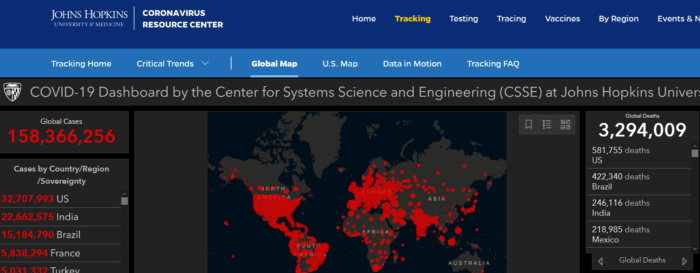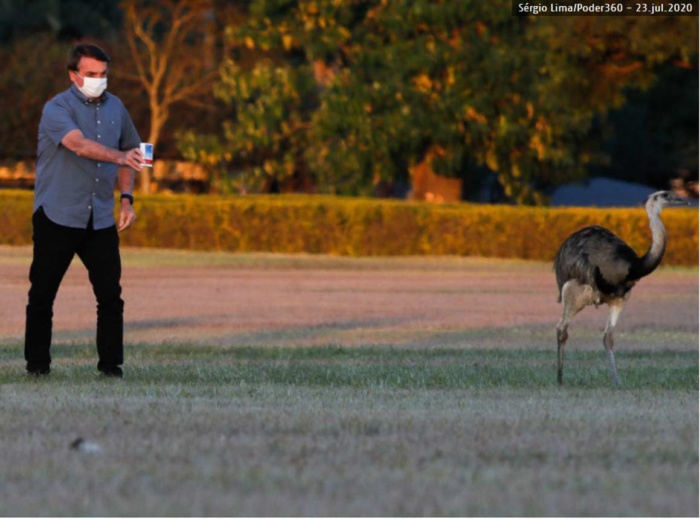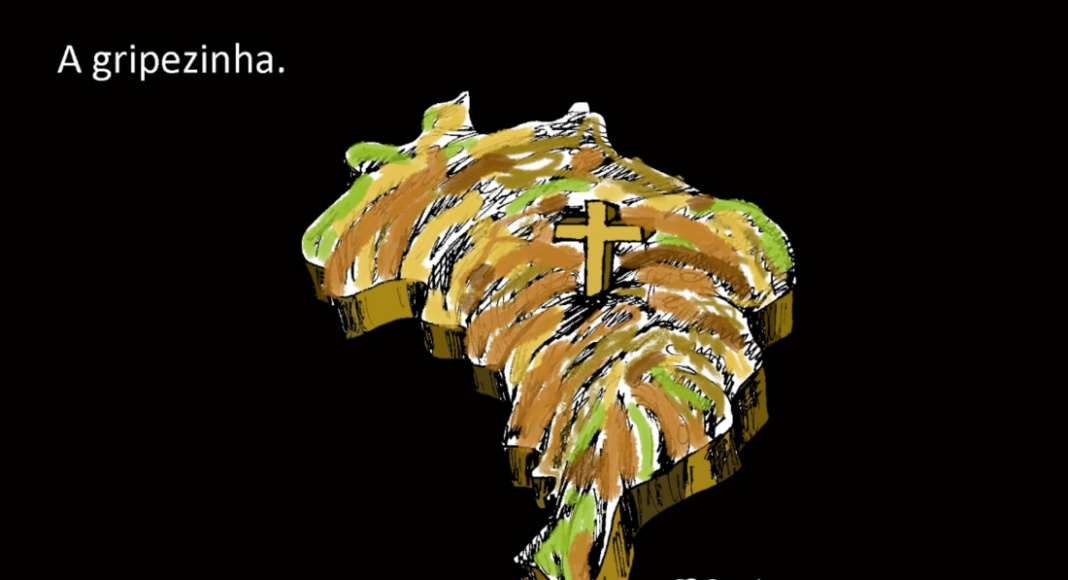This article was first published on 03 May 2021 in Portuguese by Brasil247. You can read the original here. The English translation is by by the author.
Main image: ‘Gripezinha’ means ‘a mild flu’ — the phrase Bolsonaro infamously used to characterise Covid-19. Cartoon by Rhumor do Guedes.
Brazil, once seen as a model in the fight against hunger and misery, is now taken by assault by a bunch of crazy people who beat their chests with pride when they assume themselves to be anti-science and denialists. The result is that Brazil, with less than 3 per cent of the world population, has already reached the shameful score of 13 per cent of the world total of deaths from the Covid-19 virus! And this toll only keeps increasing, with forecasts of 500,000 deaths by July 2021. And this is taking place in a country whose president and ministers have shown no consideration or respect for the life of the Brazilian population.
Yet across the world, an unprecedented and noteworthy milestone for humankind has just been reached: a billion doses of Covid-19 vaccines have been given to 570 million people around up to 27 April. And the most surprising thing is that this milestone was reached only four months after the start of vaccination on a global scale. The forecast is that the second billion people will be vaccinated in an even shorter time.
This means that about eight per cent of the world population received at least the first dose of one of the several vaccines available. Although the rapidity and extent of the roll-out are amazing, the percentage reached – according to WHO and scientists – is still very low, since to control the pandemic it should reach 70-75 per cent.
Furthermore, the distribution of vaccination across countries is quite uneven, with some developed countries having already achieved this goal and others rapidly approaching. In the poor and peripheral countries, the percentages are still much lower, around nine to 10 per cent.

Brazil’s ‘anti-science’ government
So how is Brazil doing in providing immunisation against a disease that had claimed, by 1 May, more than 406,000 Brazilian lives? (Johns Hopkins University gives the total number of Covid deaths in Brazil by 10 May as 422,340.) The answer to that question, unfortunately, is a definite thumbs-down for a country that has had, for decades, thanks to the Brazilian National Health Service (SUS), a very well-structured and free national immunisation program.
So far, we have managed to vaccinate only 14 per cent of the population with the first dose and a less significant seven per cent with two doses. We are, therefore, a very long way from achieving the 70-75 per cent target which is likely to be reached in late 2022 at the earliest. In comparative terms, we are on an equal footing with much poorer and markedly less developed countries.
Two of the most important scientific journals, Nature (open access) and Science (requires subscription), dedicated extensive articles recently to the worrying health situation in Brazil. It is no coincidence that these two authoritative and prestigious publications look at the country with mounting concern and independently publish articles whose contents are notably critical of the policies being practiced by the Bolsonaro government.
Nature highlights the anti-science actions of the government, saying, after hearing Brazilian scientists engaged in the fight against Covid-19, that the same government has miserably failed to provide a science-based response to the health crisis. Epidemiologist Jesem Orellana, from Fiocruz in Manaus, told the magazine that at least half of the projected deaths are preventable, and that the situation is a ‘total disaster’.
The journal also found that, instead of prioritising investments in fighting the pandemic, President Bolsonaro acted to sabotage science. As a result, the study of the P1 variant of the virus, which emerged in Amazonas, was hampered.
According to virologist Maurício Nogueira of the FAMERP medical school, in São José do Rio Preto (São Paulo state), ‘We did not have the resources to try to understand the reasons behind the virulence of the variants, due to the lack of equipment and reagents’.
Nature also indicates that substantial cuts in funding for scientific projects and funding for education in general have been imposed since Bolsonaro’s inauguration in 2019, offering the virus a fertile field to spread. Natalia Pasternak, a microbiologist and president of the Instituto Questão de Ciência, told Nature that, thanks to the cuts imposed on federal research funding agencies, no Brazilian scientist has been able to predict the scale of the disaster that is occurring in the country.

The terrible example set by the President encouraged a significant part of the population to downplay the dangers and risks of the disease, to avoid wearing masks (as the president himself has persisted in doing when appearing in public) and ignoring social distancing. It is social distancing, according to Bolsonaro, which is the main culprit for the economic crisis, and he holds governors and mayors responsible for its implementation, which he claims is unnecessary.
And to crown his efforts on behalf of the virus, Bolsonaro advocates the quackery of ‘early therapy’, cutting a pathetic figure as he posed for photographers, threateningly brandishing a box of chloroquine towards some poor frightened emus who frequent the lawns of the Palácio da Alvorada, the official presidential residence.
Clearing the ground for new viruses
Science highlights worldwide concerns that humans may be infected by diseases that are as yet unknown. In the article, the journal reports the pioneering work of monitoring these zoonoses, which had been carried out since 2012 by professors and students at the Federal University of Amazonas, in collaboration with Fiocruz da Amazônia. With the help of funding from USAID, as part of the PREDICT program, a genomic repository of materials collected from animals was established.
Yet this work is currently paralyzed due to the severity of the health crisis in the entire Amazon region, and particularly in the city of Manaus, where more than 9,000 people have already lost their lives to Covid-19. These new and unknown diseases can potentially be transmitted by animals that are common in the Amazon region, home to one of the greatest bio-diversities on the planet.
On the other hand, the environmental devastation policies promoted by the president and his minister of the environment, Ricardo Salles, combined with the disorderly and predatory invasion of the region, contribute to the contact between humans and pathogens still unknown to science, putting at risk all humanity – as tragically demonstrated by the Covid-19 crisis.
The expansion of the city of Manaus, for example, comes at the expense of the surrounding forest, home to many species potentially carrying zoonoses. This group of researchers has already identified a virus that is a strong candidate for an upcoming outbreak in humans. It is the Mayaro virus, whose vector is a mosquito commonly found in the forests of the Amazon, which transmits a disease easily confused with others, such as chikungunya and dengue, for which there are still no effective vaccines.
Until Brazil manages to reach the vaccination goal established as safe by science, how many more lives will be sacrificed by the pro-virus actions promoted by the Bolsonaro government? That is the question asked by people from all over the world with whom I am in regular contact, and for which, with a lump in my throat, I can find no answer.
Alvaro Penteado Crósta is Professor at the University of Campinas (UNICAMP) and Researcher at the Brazilian National Council for Research (CNPq). He was Deputy Vice-Chancellor of UNICAMP (2013-2017), and Director of the Geosciences Institute (2005- 2009). He is a full Member of the Brazilian Academy of Sciences.

